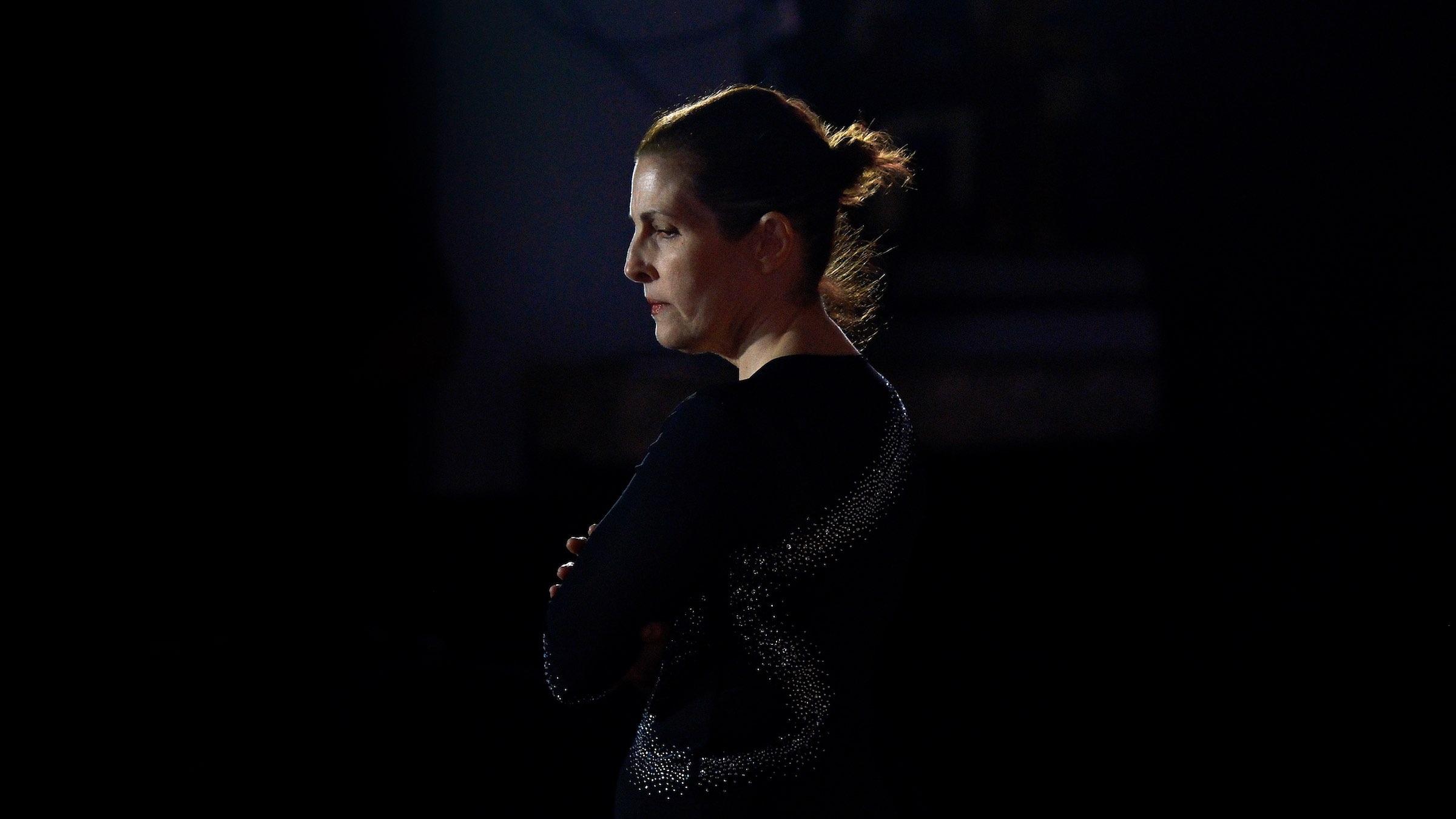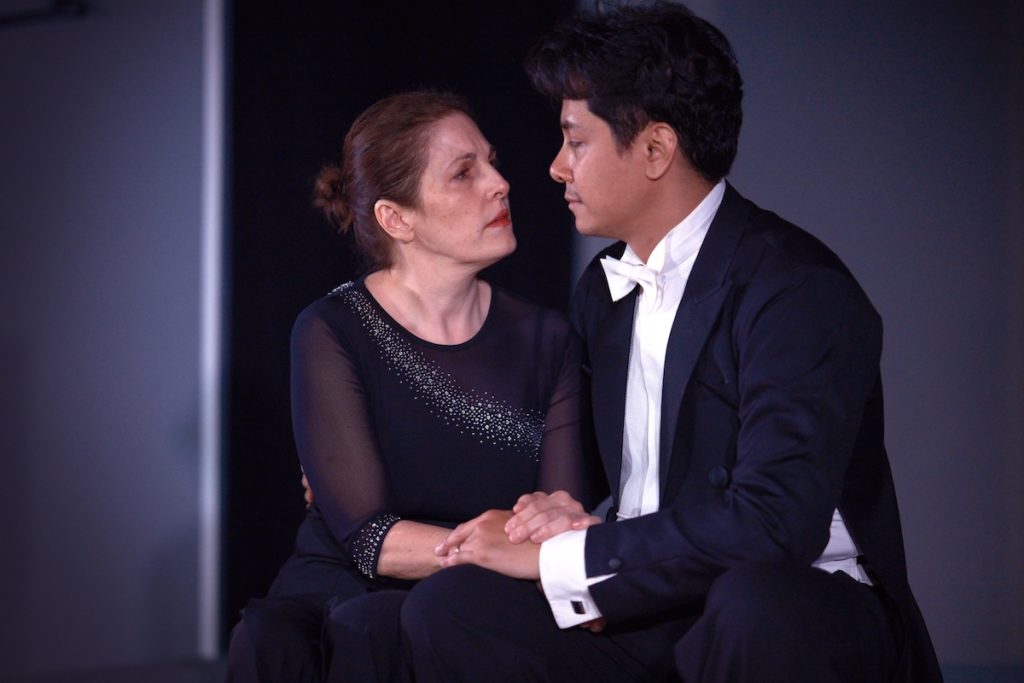With the influx of touring productions playing in the most popular houses in the city, it’s understandable if alternative venues and the productions mounted in them receive less attention. Metro Manila’s vibrant fringe theatre scene often serves as a crucible for bold new voices and narratives, and Chesie Galvez-Carino’s “Dedma” a twin-bill mounted by Theatre Titas playing at the Mirror Studio in Poblacion, is a prime example of this vital function. These smaller stages provide a space for experimentation, allowing playwrights to workshop fresh ideas and for audiences to engage with stories that might not yet find a home in the mainstream theater scene. “Dedma,” currently showcasing its insightful exploration of social dynamics, offers precisely this kind of intimate and thought-provoking experience that should be experienced by more audiences.
In “Let’s Do Lunch”, directed by Maribel Legarda, the first half of the twin-bill, we’re treated to a delicious cup of tea in the form of a fairly tense afternoon between two old friends (and one very TikTok savvy maid). In its very personal way, it explores themes of friendship, class, and how women deal with adversity. Val (Naths Everett), a woman of leisure hosts a luncheon for Issa (Issa Litton), a friend who appears to have been out of the loop. It eventually becomes clear that Issa used to be a close friend who fell on hard times as her family fell victim to a particularly vicious Ponzi scheme. It’s a study in hilarious awkwardness as the two try to navigate the new realities their now disparate social positions, the tense atmosphere is further kept light by the scene-stealing maid, Bebang (Ash Nicanor). Forming the other half of the twin-bill, “The Foxtrot”, directed by Paul Alexander Morales tells the story of Diego (JC Santos), and his student Anna (Jackie Lou Blanco). It follows the course of a dance class as Anna prepares for a competition, and Diego prepares for his upcoming marriage and eventual migration to the US. It is a delightful exploration into the complicated power dynamics between the young, dashing teacher, and the mature, richer student. A common conceptual thread between these two plays deal with power and how it changes people depending on their position in the social pecking order.
The writing by Galvez-Carino is what really stood out and it is what takes center stage in both halves of the show. The writing is crisp, witty, and sharp. It is a brilliant example of Millennial Theatre: dealing with references and situations that resonate with the country’s 30-something demographic in a language they understand. Let’s Do Lunch could have been playing out at any number of homes in the gated communities of the metro, or at any table in any restaurant in Greenbelt (Perhaps not Jollibee, but you get my point). Galvez-Carinio crafted a script where every line feels purposeful, each word chosen to layer meaning, provide humor, and advance the narrative with remarkable efficiency. Exposition is woven seamlessly into dialogue, giving you bits and pieces that flesh out the story between the two main characters, and their fear, insecurities and ultimate motivations are subtly revealed through carefully constructed exchanges that are so deftly handled by Everett and Litton that its impact truly resonates in retrospect. The pacing is quick and snappy, with clever banter. Interestingly, the playwright avoids lengthy monologues, which works wonders to maintain the pace, instead relying on the power of implication and verbal barbs, trusting the audience to actively engage with the unfolding drama.
The cleverness extends beyond mere efficiency. Galvez-Carino employs recurring motifs and linguistic echoes that subtly connect the first and second play in the twin-bill. In The Foxtrot, she created a sweet story: a rich story interwoven into dance and movement. The dialogue is frequently imbued with double entendres and veiled references, demanding close attention. Even seemingly throwaway lines often carry a weight that becomes apparent later in the play, demonstrating a meticulous level of planning and foresight. The play’s central conflict is explored not through overt declarations but through a series of nuanced verbal sparring matches, where power dynamics and hidden agendas between the characters of Diego and Anna are revealed through subtle shifts in language and tone. This intelligent approach to storytelling elevates “The Foxtrot” beyond a simple narrative, transforming it into an intricate intellectual and terpsichorean puzzle that lingers in the mind long after the final curtain. The sheer precision of the writing is a testament to Galvez-Carino’s skill and a genuine delight for anyone who appreciates the power of carefully chosen words.

The performances in both plays in “Dedma” were uniformly strong, with each actor bringing nuance and depth to their respective roles. Naths Everett delivered a wickedly delightful, subtly layered portrayal of Val. She expertly conveyed Val’s outwardly polite, yet palpably discomfited facade, as she sat through the awkward meal, hinting at both lingering affection and a clear social unease with such a high level of authenticity. Issa Litton, as the down-on-her-luck Issa, captured the character’s quiet dignity and underlying vulnerability with a compelling stillness. However, it was Ash Nicanor as Bebang, the TikTok-savvy maid, who truly stole scenes with impeccable comedic timing and magic tricks.
In “The Foxtrot,” JC Santos embodied the youthful charm and subtle ambition of dance instructor Diego. Santos skillfully portrayed the character’s shifting dynamic with his student, moving from confident instructor to someone grappling with his own impending life changes. Jackie Lou Blanco as Anna offered a nuanced performance, revealing the character’s determination, a hint of longing, and ultimately the crushing weight of social expectations and duty beneath a composed exterior. Blanco effectively conveyed the power dynamics at play, showcasing Anna’s quiet strength. Both casts demonstrated a keen understanding of their characters’ motivations and the delicate social intricacies woven in the writing. The actors’ ability to embody the subtle shifts in power and the underlying emotional currents of each play was crucial to the overall success of “Dedma,” leaving a lasting impression of well-crafted and thoughtfully executed performances.
Dedma will have its final weekend from in its March 28 – April 13, 2025 run at the Mirror Studio Theatre 2, with 8pm performances Fridays thru Sundays and 3pm matinée performances on Saturdays and Sundays.
Click here for more stories like this. You may also follow and subscribe to our social media accounts: Facebook, YouTube, Instagram, TikTok, Twitter, and Kumu.

























